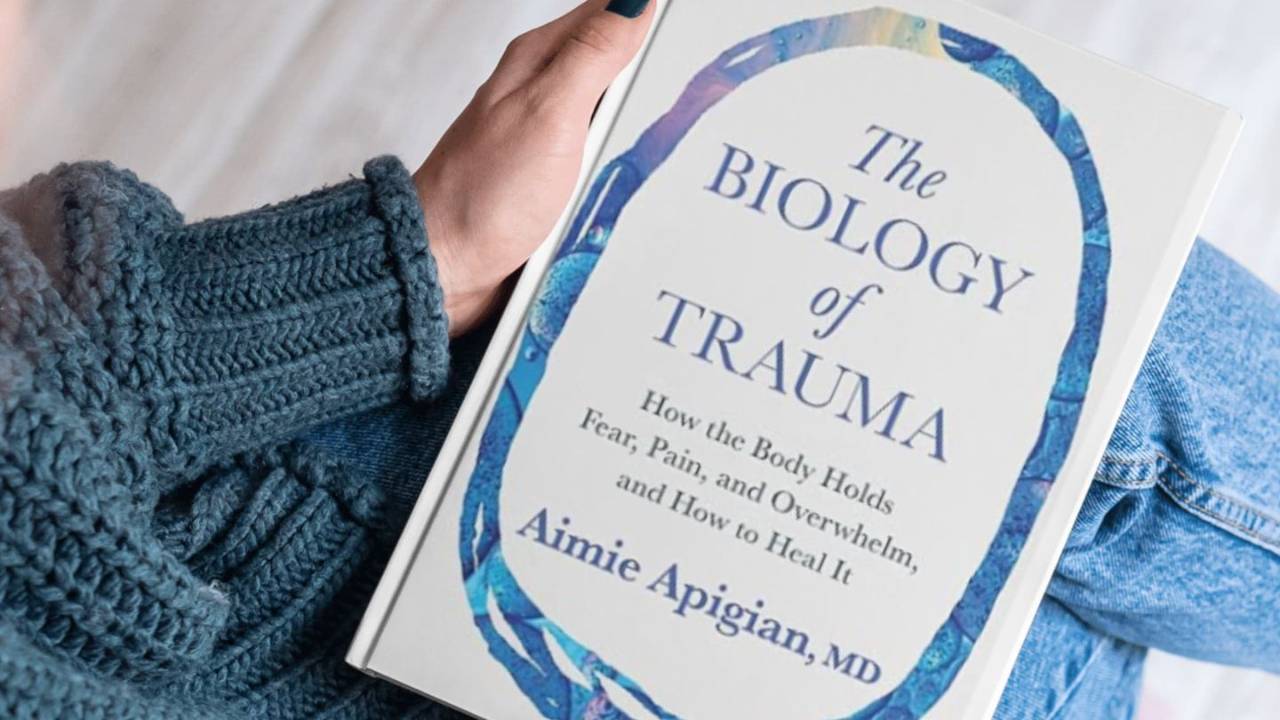The Biology of Trauma Book Synopsis (Webinar Summary)
Oct 15, 2025
Quick recap: TL;DR
Taylor introduced a book synopsis for Dr. Aimie Apigian's "Biology of Trauma" and shared endorsements from prominent figures in the field, while conducting a somatic exercise to help attendees enter a parasympathetic state. She discussed the connection between chronic health issues and trauma biology, emphasizing the importance of addressing root causes rather than just managing symptoms through conventional healthcare approaches. Taylor shared her journey from crisis counseling to remote health consulting, highlighting her expertise in helping individuals address body dysfunction and trauma-induced health issues through personalized treatment approaches.
Biology of Trauma Book Introduction
Taylor introduced a book synopsis for Aimie Apigian, MD "Biology of Trauma: How the Body Holds Fear, Pain and Overwhelm and How to Heal It," which became a U.S.A. Today top 10 bestseller. She shared endorsements from renowned figures in the field, including Dr. Partha Nandi, Peter Levine, Stephen Porges, and Dr. Gabor Mate, who wrote the foreword. Taylor emphasized the sensitive nature of the topic and provided a disclaimer about the educational purpose of the information shared. She conducted a somatic exercise to help attendees enter a parasympathetic state, encouraging them to connect with their bodies and breathe deeply.
Chronic Health and Trauma Connections
Taylor discussed the connection between chronic gut, brain, and autoimmune symptoms and trauma biology, emphasizing that conventional healthcare may not always be effective. She highlighted the importance of understanding and addressing the root causes of these symptoms, including nervous system dysregulation, nutrient deficiencies, environmental toxins, chronic infections and limiting beliefs (mindset). Taylor encouraged participants to consider the latest trauma treatment approaches and shared her mission to help individuals achieve optimal peace and energy. She also mentioned a special gift for those who attended the live session and encouraged participants to share their experiences in the chat.
Chronic Health and Nervous System
Taylor discussed the connection between chronic physical health issues and the nervous system, emphasizing the need for both mental and physical health treatments to address stored overwhelm. She shared her background as a former counselor with experience working with trauma and vulnerable populations, highlighting her expertise in helping natural health seekers identify and address body dysfunction without drugs.
Trauma and Health Connection Insights
Taylor discussed her journey from working in crisis situations to focusing on health and wellness, inspired by her studies on adverse childhood experiences and trauma. She highlighted Dr. Aimie's work on the biology of trauma, which helped her understand how the body stores emotional pain and affects health. Taylor now works remotely in a hybrid model, serving savvy clients who are knowledgeable about longevity and biohacking treatments. She emphasized that while these treatments can be beneficial, they may not address the root causes of trauma-induced health issues, suggesting that biohacking and conventional care models might overlook the body's storage of emotional pain.
Addressing Health Issues at the Root
Taylor discussed the importance of addressing the root causes of health issues rather than just managing symptoms, using a case study of a client who overcame anxiety to pursue global photography contracts. She explained Dr. Aimie's framework on trauma, highlighting the critical line of overwhelm and the need for time, energy, and safety for recovery.
The Critical Line of Overwhelm
The Critical Line of Overwhelm is unique for each individual. Every person has a different threshold shaped by life experiences: birth story, attachment history, limiting beliefs, the inner critic, biology, and genetics. When that line is crossed, our biology doesn’t just react emotionally, it shuts down: capacity narrows, systems go on hold, and coping resources (including the needs of our cells) are depleted. That biological reality is what Dr. Apigian points to when she asks us to look beyond the label of a single catastrophic event and notice how everyday factors stack up to push someone into the trauma zone.
Dr. Apigian reframes the conversation by suggesting we use the word overwhelm (or alternatives like burnout, chronic stress, or toxic stress) instead of only using “trauma,” because those terms better capture the slower build-up and the lived experience many people carry. This isn’t about minimizing war, disaster, or other major traumas from childhood (ACEs), it’s about widening the lens to include adult experiences and cumulative harms: too much, too fast, or too little, for too long. Biologically, the body responds the same way whether the trigger is a big event or a lifetime of smaller, ignored stresses.
So take a minute and notice your own experience: have you been living through too much too quickly, or too little for too long? If you’ve been naming your responses as “just stress” or “being too sensitive,” consider whether naming it overwhelm (and getting support for it) might just change how you recover and restore.
Taylor shared her Heal, Seal for the Real Deal Gut Detox community program and emphasized the role of lifestyle changes and personalized treatment in addressing the biology of trauma and chronic diseases. James, an attendee, expressed concern for his daughter's trauma and discussed the potential benefits of psychedelic treatments for her condition.
Watch the full synopsis HERE.
Next Steps
Book a Complimentary Session to Personalize your Trauma/Overwhelm/Burnout healing approach.
